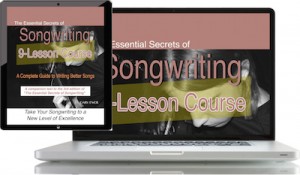The best songwriters that I know consider themselves to be “students” of songwriting, even if only in an unofficial sense. They consider every song that they hear to be an opportunity to learn something.
The problem with being a student of songwriting is that we all hold very strong opinions about music. We have our likes and dislikes. And it wouldn’t be unusual to find that you’ve got more songs that you dislike than ones that you like.
 If you like starting songs by working out chord progressions, you need this eBook: “Writing a Song From a Chord Progression.” It shows you how to avoid the typical problems that can arise from this common songwriting process. Get it separately, or as part of “The Essential Secrets of Songwriting 10-eBook Bundle.”
If you like starting songs by working out chord progressions, you need this eBook: “Writing a Song From a Chord Progression.” It shows you how to avoid the typical problems that can arise from this common songwriting process. Get it separately, or as part of “The Essential Secrets of Songwriting 10-eBook Bundle.”
When you dislike a song, it’s hard to learn from it. We’re usually too busy considering what we don’t particularly care about it. But just because you dislike a song does not mean that it’s a bad song.
If you dislike country music as a genre for example, it tends to make you dislike most country songs in general, no matter how well-written they actually are. That’s a normal response. But if you’re going to be a serious student of songwriting, even in the unofficial sense, you have to get past your dislike of genres and songs, and be willing to learn from them.
In fact, being able to spend time listening to, analyzing, and learning from a song you dislike is probably the most important part of being a student of songwriting.
Listening Objectively
This kind of listening is called objective listening, because you succeed only if you are able to put your subjective reaction — your feelings and opinions — in the background.
Once you’ve done that, you find that there is much to learn from practically any song. For any song that has been professionally produced and recorded, you should consider it a treasure trove of songwriting ideas that you can learn from in a bid to improve your own songwriting technique.
Suppressing your stronger opinions is not as difficult as it might seem. Here’s what do to:
- Look for songs specifically from genres you don’t normally like. Search online for “Best Country songs”, “Best Ska songs”, or whichever genre you’re not too familiar with.
- Adjust your frame of mind. Don’t listen with the thought in mind, “I wonder if I’m going to like this?” Think rather, “I wonder what part of this I’ll enjoy the most?”
- Listen and take notes. As in, literally keep a listening journal where you write down the title, the songwriter(s), and then make a list of the parts of the song you found most interesting.
- Listen again. You will always hear more in a song the second or third time through. Give the song a chance. And if it’s a genre you dislike, actively suppress your naturally-occurring opinions and find something positive in what you’re hearing.
Once you’ve honed your ability to learn from songs you don’t particularly care for, you’ve opened your mind to a suddenly larger repertoire of music that will influence how and what you write. And that’s a great thing.
We all have opinions, and I’m not suggesting for a moment that you can’t have those opinions. But when you’re trying to improve your songwriting technique, do what you can to suppress those strong opinions, at least while you’re in learning mode.
Then when it’s time to put some music on for your own personal enjoyment, that’s the time for your opinions. But my guess is that you’re going to discover that your musical tastes have increased and benefitted from the time you took to enhance your ability to listen objectively.
 Written by Gary Ewer. Follow Gary on Twitter
Written by Gary Ewer. Follow Gary on Twitter
 Excellence happens when you practice your technique. Gary’s 9-Lesson Course takes you through the fundamentals of writing good lyrics, melodies and chords, and helps you understand the concepts of great songwriting structure. It’s part of “The Essential Secrets of Songwriting 10-eBook Bundle.”
Excellence happens when you practice your technique. Gary’s 9-Lesson Course takes you through the fundamentals of writing good lyrics, melodies and chords, and helps you understand the concepts of great songwriting structure. It’s part of “The Essential Secrets of Songwriting 10-eBook Bundle.”










